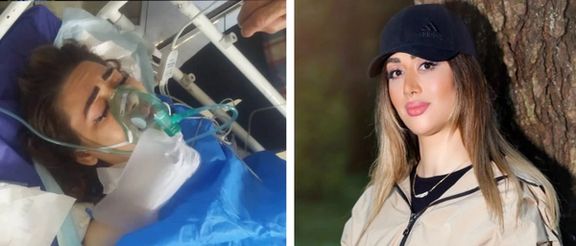Badri, a mother of two, was left paralyzed after the shooting, an incident that has ignited outrage both within Iran and on the international stage.
The family's complaint regarding Badri, who suffered severe spinal cord injuries and remains hospitalized at Valiasr Hospital in Tehran, was heard in a court this week. However, the family remains dissatisfied with the outcome and the judicial process.
Iran International has learned that she underwent another surgery on Wednesday to remove fluid accumulated in her lungs, and her condition remains critical.
According to our sources, the Badri family members have been summoned by intelligence and security agencies, pressured to stay silent, and urged to withdraw their complaint.
Sources revealed that the family, including Badri's sister, is under intense pressure from security agencies to deliver a coerced confession on camera regarding Badri's situation.
The attack on Badri took place when she was stopped at a police checkpoint while returning home with her sister after work in Noor, Mazandaran province.
According to reports and images obtained by Iran International, the police opened fire after stopping the car on a dirt road, striking Badri in the back.
A warrant for the confiscation of Badri's vehicle over an earlier alleged hijab violation led police to open fire from the rear driver's side. Sources told Iran International that Badri was initially taken to a hospital in Noor before being transferred to Imam Khomeini Hospital in Sari. Since then, her family has faced intense pressure from security forces to stay silent about the shooting and her condition.
After several days, plainclothes security officers moved Badri to Tehran for further treatment, where her spinal condition remains critical. During visits, security officers reportedly confiscate the Badri family’s mobile phones to prevent them from taking photos or videos.
The Information Center of the Mazandaran Police Command confirmed the police shooting at the car in which Badri was a passenger, stating that the driver "continued to flee despite police orders, prompting the police to shoot at the car according to the law on the use of firearms."
Sources informed Iran International that despite police claims that Badri’s car had tinted windows, they were down at the time of the incident due to the heat and lack of air conditioning in the vehicle.
Amnesty International on Wednesday called for a thorough investigation into reports that Badri was shot and left paralyzed by police while enforcing compulsory veiling laws in Iran. The organization urged that "those responsible be held to account," highlighting the urgent need to abolish veiling laws and address Iran’s "impunity crisis."
Prominent Iranian activist and journalist Masih Alinejad denounced the attack on Badri, writing on X that "the morality police shot this woman and paralyzed her over a hijab." Alinejad stressed that "regardless of who is president" in Iran, women continue to suffer for simply showing their hair, urging others to "be her voice."
Israeli Foreign Minister Israel Katz also weighed in, describing the attack on Badri as a reflection of Iran’s Supreme Leader Ali Khamenei’s “murderous dictatorship,” which he said oppresses citizens and enforces “radical Islam.”
The incident is reminiscent of previous cases, such as that of Armita Geravand, a 16-year-old who was injured and went into a coma after being attacked by hijab enforcement officers at Tehran's Shohada Metro Station on October 1 of last year. She died on October 27 after 28 days in Fajr Military Hospital.
Similarly, in September 2022, Mahsa Zhina Amini, a 22-year-old woman, fell into a coma after being arrested by Iran’s morality police. Amini was reported dead on September 16 at Kasra Hospital which sparked nationwide protests, leading to the "Woman, Life, Freedom" uprising.







